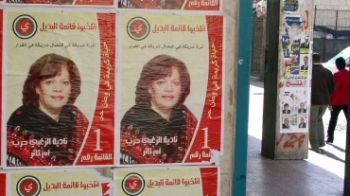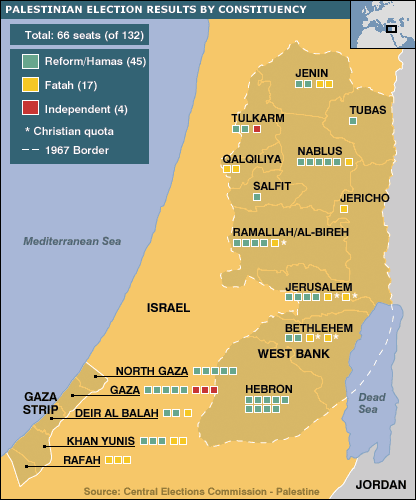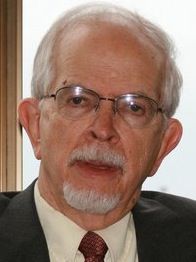
Publisher:
Bonnie King
CONTACT:
Newsroom@Salem-news.com
Advertising:
Adsales@Salem-news.com

~Truth~
~Justice~
~Peace~
TJP
Dec-19-2010 00:11

 TweetFollow @OregonNews
TweetFollow @OregonNews
The 'Little Town of Bethlehem' Still Waits for Its Stolen Democracy
By James M. Wall Salem-News.comPalestinians remain trapped in a military occupation the Israeli government forced the world to accept because the “wrong” party won.
 Courtesy: Wall Writings |
(CHICAGO) - A new Palestinian parliament was elected in the Occupied Territories on January 25, 2006. One month from this Christmas, Palestinians should have been celebrating the fifth anniversary of that democratic, internationally-monitored, election.
There will be no celebration in January, 2011.
Instead, Bethlehem, the West Bank, and Gaza still wait for the democracy that was stolen from them.
Palestinians remain trapped in a military occupation the Israeli government forced the world to accept because the “wrong” party won.
For one brief shining moment, before the 2006 results were rewritten to fit the Zionist narrative, democracy lived in the land where Christ was born.
In a story of rare candor for a major American news outlet, on January 26, 2006, the Washington Post reported the elections fairly. The Post began its coverage:
The radical Islamic movement Hamas won a large majority in the new Palestinian parliament, according to official election results announced Thursday, trouncing the governing Fatah party in a contest that could dramatically reshape the Palestinians’ relations with Israel and the rest of the world.In Wednesday’s voting, Hamas claimed 76 of the 132 parliamentary seats, giving the party at war with Israel the right to form the next cabinet under the Palestinian Authority’s president, Mahmoud Abbas, the leader of Fatah.
Fatah, which has dominated the legislature since the previous elections a decade ago and the Palestinian cause for far longer, won 43 seats. A collection of nationalist, leftist and independent parties claimed the rest.
The Post writer had not received the Israeli media narrative when he wrote that lead. He reported the election as it happened, giving his readers the facts and speculating on the impact the Hamas victory would have on future relations between the Palestinians and Israel.
US Secretary of State Condoleezza Rice was shocked at the election results. Israeli intelligence had assured her that Fatah would win. She had not counted on having to deal with a non-subservient Palestinian leadership.
Israel claimed to be as surprised as Rice, which was unlikely, since Israel had its own intelligence agents swarming all over the occupied territories.
Israel had agreed to tolerate the election, knowing that if Hamas won, the results could easily be manipulated to fit the scenario Israel would write.
The election results were revised to fit the standard “terrorism” narrative. It works this way: When Israel does not win a war or an election, it simply rewrites the script to conform to whatever fits Israel’s preferred story line.

Israel’s version, which a compliant world media, endorsed, quickly converted victorious Hamas legislators like Jabalya refugee camp resident Youssef Shrafi, at left, from a family man to a “terrorist”.
This Reuters photo ran next to the January 26, 2006, Post story. This picture may well represent the last time an Hamas politician was correctly identified in an American newspaper as a family man.
Israel could not allow Hamas to be seen as a political party that had won an election the way parties do in a democracy. Hamas had to be peddled as a “terror” organization that is a theat to world peace, a narrative pattern that continues to this day, as Israel and its US neoconservative allies pound the war drums against Iran.
On election day, 2006, I was in Bethlehem, where I watched long lines of voters participating in the core event of a democracy, choosing their leaders.
The Bethlehem city council already had a majority of Hamas members, and on the day of the election, the green colors of Hamas dominated the square outside the polling place I visited.
I walked into the polling place and saw election judges checking credentials. One official asked me, politely, to move away from the voters; no electioneering inside the polling place. I told him I understood.
The picture above, of political posters plastered neatly on a building in downtown Bethlehem, was one I took on election day. Hope was in the air. There was joy that a people living under military occupation might soon come together to slowly and no doubt, painfully, build their own stable, peaceful, country.
So Israel did what it always does. It played the fear card and arrested half of the victorious Hamas legislators before they could be sworn in. Many of those arrested still languish in an Israeli prison five years later.
Following Israel’s script for the next five years, Israel, the US and the European Union refused to accept the results of the 2006 election.

Immediately, Israel took over the story. Since the Hamas legislative majority had been deemed by Israel and the US to be a “terrorist” organization, all outside funding was funneled to the now minority Fatah party, which remained under Israeli control. Cutting off the funding was intended to starve the Hamas political organization, leading to it failure.
But Hamas did not fail, not even after Israel sealed the Gaza strip.
An ongoing economic blockade and periodic military assaults on Gaza’s civilian population, in “retaliation” for home-made rockets fired into Israel by non-Hamas forces, also did not lead to Hamas’ defeat.
Hamas simply hunkered down; its army defeated Fatah in a US endorsed civil war in which Fatah’s army was funded and trained by the US military.
Israel became an even more isolated military fortress, threatening its neighbors and encouraging the US to come over and save the world from the deadly non-existent Iraqi WPDs. With that successful enterprise completed, Israel turned to the nuclear threat it insists it sees in Iran...
Five years after that brief 2006 shining moment when democracy threatened to break out in Palestine, the military power that is Israel stands alone in the Middle East, a nuclear-armed behemoth that has abandoned any pretense of democracy even as it continues to cling to the fiction that it is the “only democracy” in the region.
The US did its part for Israel, taking advantage of a divided Palestinian political structure. The US lured Fatah leader Mahmoud Abbas into agreeing to “talk” to Bibi Netanyahu, a man who likes to talk so long as nothing is said that would deter his goal to extend the state of Israel from the Mediterranean Sea to the Jordan River.
A few weeks before the fifth anniversary of the 2006 legislative election, another Christmas season is upon us.
Church congregations will gather together and sing traditional hymns, celebrating the birth of a child in a manger in the little town of Bethlehem, a little town that is no longer little, living within an Israeli-built wall, with limited access to the outside through Israeli-controlled check points.
In most of those churches, on Christmas Eve, members will sing O Little Town of Bethlehem or Silent Night with little thought of those Palestinians who, for a brief, shining moment almost had a democracy in which they might have finally been able to move freely throughout the land of Palestine.
When church congregations see their own small children stand around a manger scene in the front of the sanctuary, their eyes wide as they await the arrival of the wise men from the east, will any of them pause, even just for a moment, to wonder what life is like today for children in the land where Jesus was born?
This two minute clip reports on a Palestinian family living under military occupation in Palestine, five years after the 2006 election, and two thousand years after the the birth of the Christ child. The video was produced by the Israel-based human rights organization, B’tselem.
Archbishop Desmond Tutu was interviewed by a Boston Globe reporter in 2007. The South African leader was asked by the reporter what he had seen and heard in the Holy Land on his recent visit there. He responded:
Some people cannot move freely from one place to another. A wall separates them from their famlies and from their incomes. They cannot tend to their gardens at home or to their lessons at school.They are arbitrarily demeaned at checkpoints and unnecessarily beleageured by capricious applications of bureaucratic red tape.
I grieve for the damage being done daily to people’s souls and bodies. I have to tell the truth: I am reminded of the yoke of oppression that was once our burden in South Africa.
In a folder encouraging visitor to visit Bethlehem in 2010 and 2011, the American Association for Palestinian Equal Rights reports:
A recent United Nations report stated that the wall and other measures imposed by Israel have “reduced Bethlehem’s development space, limited its access to resources, severed Bethlehem’s historical links to Jerusalem and restricted the urban area’s potential for residential and industrial expansion.”
These measures have severely damaged Bethlehem’s tourism industry, a major part of Bethlehem’s economy, a city still waiting for its stolen democracy.
 Journalism was Jim Wall’s undergraduate college major at Emory University, Atlanta, Georgia. He has earned two MA degrees, one from Emory, and one from the University of Chicago, both in religion. An ordained United Methodist clergy person; he and his wife, Mary Eleanor, are the parents of three sons, and the grandparents of four grandchildren. They live in Elmhurst, Illinois.
Journalism was Jim Wall’s undergraduate college major at Emory University, Atlanta, Georgia. He has earned two MA degrees, one from Emory, and one from the University of Chicago, both in religion. An ordained United Methodist clergy person; he and his wife, Mary Eleanor, are the parents of three sons, and the grandparents of four grandchildren. They live in Elmhurst, Illinois.
Jim served for two years on active duty in the US Air Force, and three additional years in the USAF (inactive) reserve. While serving with the Alaskan Command, he reached the rank of first lieutenant. He has worked as a sports writer for both the Atlanta Journal and Constitution, was editor of the United Methodist magazine, Christian Advocate for ten years, and editor and publisher of the Christian Century magazine for 27 years, starting in 1972. Time magazine wrote about the new editor, who arrived at the Christian Century determined to turn the magazine into a hard-hitting news publication. The inspiration for Wall Writings comes from that mindset and from many other sources that have influenced Jim’s writings over the years, including politics, cinema, media, American culture, and the political struggles in the Middle East. Jim has made more than 20 trips to that region as a journalist, during which he covered such events as Anwar Sadat’s 1977 trip to Jerusalem, and the 2006 Palestinian legislative election. He has interviewed, and written about, journalists, religious leaders, political leaders and private citizens in the region. You can write to Jim Wall at jameswall8@gmail.com. Visit Jim's Website: Wall Writings
Articles for December 18, 2010 | Articles for December 19, 2010 | Articles for December 20, 2010
Quick Links
DINING
Willamette UniversityGoudy Commons Cafe
Dine on the Queen
Willamette Queen Sternwheeler
MUST SEE SALEM
Oregon Capitol ToursCapitol History Gateway
Willamette River Ride
Willamette Queen Sternwheeler
Historic Home Tours:
Deepwood Museum
The Bush House
Gaiety Hollow Garden
AUCTIONS - APPRAISALS
Auction Masters & AppraisalsCONSTRUCTION SERVICES
Roofing and ContractingSheridan, Ore.
ONLINE SHOPPING
Special Occasion DressesAdvertise with Salem-News
Contact:AdSales@Salem-News.com
googlec507860f6901db00.html




Terms of Service | Privacy Policy
All comments and messages are approved by people and self promotional links or unacceptable comments are denied.
Anonymous December 19, 2010 11:50 am (Pacific time)
It seems as tho the U.S. is not much different than Palestine..except instead of Israel using bombs, they simply infiltrated the education system and the media, and 99% of DC. We are also prisoners of israel. But israel is nothing more than a prodigy child of the house of rothschild. History proves it.
[Return to Top]©2025 Salem-News.com. All opinions expressed in this article are those of the author and do not necessarily reflect those of Salem-News.com.